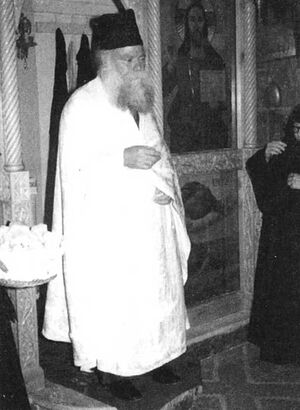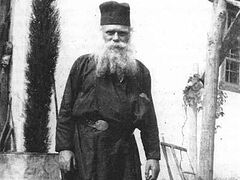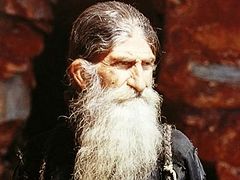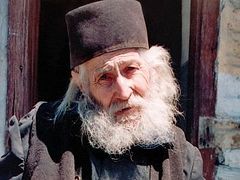 Hieromonk Nikodemos of Karyes —Your Reverence, Fr. Nikodemos, I came here, to the homeland of Orthodox monasticism—to Holy Mount Athos from Romania to receive the blessing of the Most Holy Theotokos and the bright instructions of your holiness. We, the monks of Romania, are more engaged in mission and less in prayer. What’s better for us to do?
Hieromonk Nikodemos of Karyes —Your Reverence, Fr. Nikodemos, I came here, to the homeland of Orthodox monasticism—to Holy Mount Athos from Romania to receive the blessing of the Most Holy Theotokos and the bright instructions of your holiness. We, the monks of Romania, are more engaged in mission and less in prayer. What’s better for us to do?
—Serving others in the world, venerable Father, is prayer. Receive people with prayer, because it’s God sending them to the monastery. Let us first calm the souls of Christians, and then, if time remains, go to church for the Divine services. Pray according to your strength and the time you have.
—Some of us want to come to the Holy Mountain and remain here. What’s better: to come, or to continue with our missionary work among our people?
—Stay there, where God brought you to life, because you can do much there, sacrificing yourself for the sake of the salvation of others. But if someone desires with all his heart to be a hermit and pray in solitude, with tears, weeping, and repentance, then let him come here to the Holy Mountain, because there are many cells here that are empty, without monks. But if he has doubts, let him pray harder and follow the advice of his spiritual father and bishop.
—We are in need of good spiritual fathers—both we and the people. What can you say about this?
—Christ Himself said: The harvest truly is plenteous, but the labourers are few (Mt. 9:37). But let us not lose hope: God takes care to bring the workers to His field. There are always periods of spiritual crises, but God always sends chosen, spiritual people—hierarchs who can guide people to salvation.
—What advice can you give us unto salvation?
—Have more love for God and man! On these two wings we will soar to Heaven. These two commandments are the source from which blessings flow for us, and upon them hangs all the Law and the Prophets, as Christ said (Mt. 22:40). Our hearts should burn with love for God and our eyes should be filled with tears of compassion for our brothers, because they are also created after the image and likeness of God, our Creator, and are like us.
—What penance should be given to those who live in fornication?
—If they repent and no longer commit this sin, we soften the penance by half. Let us do everything with discernment!
—What should we do with young unmarried people who sin?
—Let us reduce their penance by half, so as not to completely alienate them from God and the Church and then completely lose them.
—And for those who use contraceptives, what can we do?
—For them, we need to conduct continuous catechism and teaching, and also pray to God to enlighten them. If they don’t give up their sin, we don’t commune them, because their Confession and repentance are insincere and done with guile. Let us postpone giving Holy Communion to such people until they forsake their sin and turn to having children. One great bishop said that even if they’re under penance, they can commune once a year, on Holy Pascha, so they won’t completely depart from Christ and His Church.
—How often should the laity commune?
—St. John Chrysostom says that it’s how you commune that’s important, but doesn’t tell us how often to commune them.
—How can we know that we’re ready to commune?
—God knows the heart of every man. If our conscience doesn’t convict us of anything, it’s a sign that we can approach Christ.
From the book Counsels From the Holy Mountain: Talks with Contemporary Athonite Fathers (Povățuiri din Sfântul Munte. Convorbiri cu părinți athoniți contemporani) by Monk Damascene of Grigoriou. Arad: Editura Sfântul Nectarie, 2009. P. 99–110.



